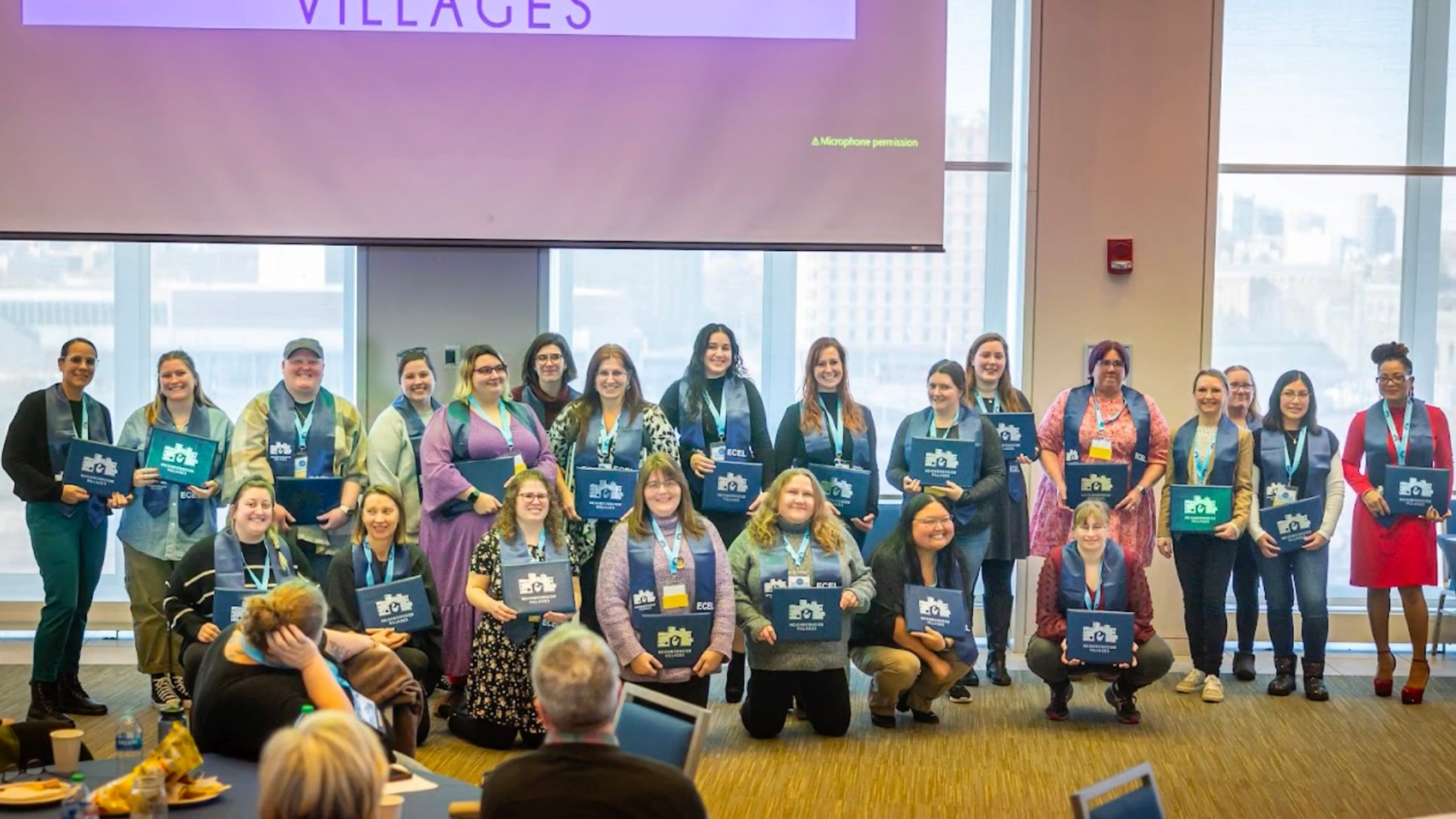Cassandra Antoine always knew she wanted to work with children. Her goal was to open her own child care center, but she didn’t have a teaching certificate and worked full time while raising twins. But when her supervisor at the YMCA in Dorchester, MA, approached her about an apprenticeship program where she could earn a teaching certificate, she realized this was an opportunity she could take on while still working full time.
“I didn’t have to leave my house,” Antoine said. For a full year, from 6:30-9:30 every Wednesday night, Antoine logged on via Zoom with 16 other early childhood educators who participated in the apprenticeship program to receive their Child Development Associate Certificate, or CDA. It took a single year to complete and she was still paid for her time, receiving a $250 stipend every two weeks for taking the class. Each time she completed 500 hours of training, she also received a 50-cent hourly raise at her YMCA job. By the end of the program, she’d completed 2000 hours and received $2 more per hour.
The apprenticeship required a portfolio, work and homework pertaining to early childhood, as well as in-classroom observation and a written test. Antoine felt the year of coursework left her well prepared for that final exam. “It’s not long and it’s not hard,” she said. She passed, and in February of 2024, she joined 67 other apprentices in Neighborhood Village’s first ever graduation ceremony, with her family and friends in the audience.
The graduation ceremony, where Antoine received her CDA, was “a mini wedding” according to Binal Patel, chief program officer with Neighborhood Villages. Three hundred people attended – graduates with their friends and families, and children of their own. Individual names were read and each graduate walked across the stage. The Massachusetts Secretary of Labor delivered the keynote address. (Massachusetts has long been lauded for its state support of early child care programs, including creation of $475 million in state funding to sustain Commonwealth Cares for Children operational grants, or “C3” grants, which send funds directly to child care programs.)
Now that she has her CDA, Antoine is certified as a K-1 teacher, which includes working with preschool-aged children. “More doors are opening up to me,” she explained. In addition to her raise, she received a promotion at work and is now the assistant director at the YMCA. She’s still exploring opening her own child care center, either in Massachusetts or in her native New York.

The Value of Apprenticeship Programs
Apprenticeship programs are lauded for combining on-the-job training with classroom instruction, so that workers gain skills needed for the job while still having the requisite experience many employers require before hiring. Many apprenticeship programs, like the one Antoine was enrolled in, are also paid, allowing more people from different socioeconomic backgrounds to take part. Upon completion, the certification, license or degree can lead to future earnings opportunities, and for a field like child care which is experiencing a dire staffing shortage—particularly in leadership fields—these apprenticeship programs can boost the pipeline of qualified staff.
Patel first learned of such early childhood apprenticeship programs at the ECEPTS conference in 2022, where she connected with someone who had helped launch a similar program in Kentucky at the Governor’s Office of Early Childhood. Though Kentucky has registered and started the program, their cohort has not graduated yet, so the Neighborhood Villages cohort is the first in the country to graduate with a Registered Apprenticeship in Early Childhood Administrator/Director through the Department of Labor.
When Neighborhood Villages graduated 68 apprentices in February, this made its program the largest early childhood registered apprenticeship program in Massachusetts. Over half of the graduates (37 participants) received their Child Development Associates and the remaining 31 received their Lead Teacher certificate, which qualifies them to be a child care or preschool director. The program and its graduation were successful enough that six of the CDA graduates are now continuing on with the Emerging Leaders Program.
Hope Olson is of those recent graduates who is going on to the Emerging Leaders Program. Olson grew up in New Hampshire about an hour from the sea coast and was always drawn to outdoor activities. She majored in environmental studies in college and upon graduation began working at the Boston Outdoor Preschool Network, a nature-based early childhood program.
“I haven’t ever thought of it as a switch, actually,” she said, regarding her pivot from environmental studies to teaching. “I was drawn to the job because I’ve always worked with children. It combined my love for outdoor education with children and working with children.” But Olson recognized that she didn’t have the traditional background for teaching, and when her supervisor mentioned the apprenticeship program, she enrolled. Like Antoine, she was emphatic about the experience, coursework and graduation ceremony. “Adding on this program made me feel capable in this role,” she said. Once she completed her CDA, she enrolled in the Emerging Leaders Program, and plans to keep learning while teaching. “These are stepping stones to pursue teaching further or find myself in a director role,” she said.
Funding the Neighborhood Villages Apprenticeship Program
The Neighborhood Villages’ Apprenticeship Program is managed by Neighborhood Villages but features a variety of funding sources, including the City of Boston, which boosted American Rescue Plan funds, and the State’s Executive Office of Labor and Workforce Development (EOLWD) Labor (Mass Dept of Labor). There was also private philanthropic support for the initial cohort, but Patel said they anticipate that the program will be primarily funded by EOLWD going forward.
Their success with the apprenticeship program has allowed for more opportunities for such programs to grow. Neighborhood Villages has received the designation of “ambassador” to support the expansion of Early Childhood Registered Apprenticeship programs in Massachusetts, and serve as a liaison with EOLWD and programs who already have apprentices, or are looking to register new ones.
Patel explains that they are consulting with organizations that would like to register their programs to ensure they know the process and required paperwork and components, including registering the program with the YMCA and working with For Kids Only to register the first out-of-school time educator apprenticeship program. Other states have heard about their program, and reach out for information and assistance.
“Registered apprenticeships are fairly new in this industry and are continuing to grow very quickly!” Patel said.
This year, Patel plans to present at three national conferences to share their work on apprenticeship and everything they have learned, including returning to the conference where she first learned about apprenticeships, in hope of inspiring another person to start their own. She is returning to the same conference she went to in 2022, “Except this time I was invited as a presenter!” she said. “I am excited to share about our program and all of the lessons we have learned, and hopefully inspire others that they can do it too!”

Rebecca Gale
Rebecca Gale is a writer with the Better Life Lab at New America where she covers child care. Follow her on Instagram at @rebeccagalewriting, and subscribe to her Substack newsletter, "It Doesn't Have to Be This Hard."


